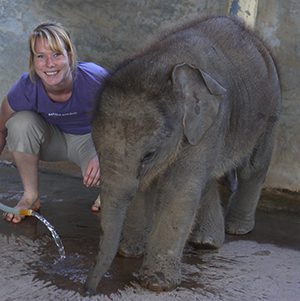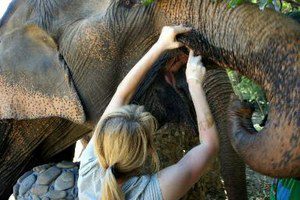
Just days after her May 3 commencement, Erica Ward will be on a plane, heading for the Elephant Nature Park (ENP) in Thailand’s Chiang Mai province where she’s been hired as a full-time veterinarian.
Ward had wanted to travel to Asia since she was an undergraduate, and in her second year of veterinary school she organized a group-specific trip for veterinary and pre-veterinary students through International Student Volunteers. The group traveled to ENP, a sanctuary for elephants rescued from the tourist and logging industries. ENP welcomes visitors as part of a volunteer program prioritizing education and sustainability, allowing for non-harmful, first-hand experience with elephants.
Most volunteers at ENP help plant banana trees and cut corn, observing and sometimes feeding and bathing the elephants. “The volunteer company told us we probably wouldn’t be able to actually do veterinary work,” Ward said, “I thought it would be worth it even if we just had a lecture from a veterinarian.” When Ward and her group arrived, however, they were able to do much more than they’d planned, helping with treatments on elephants at the park, and going into the village to de-worm and vaccinate dogs. By the time she left, Ward was hooked. “Before I went, I was thinking it was going to be like any other trip. I didn’t realize how much it was going to change my life,” she said.
Ward quickly moved to improve upon the program for a return trip. She traveled to 10 universities, sending a recorded presentation to many more, and recruited 40 students to participate the following summer. “I was able to organize it, with the help of a lot of my classmates, so that I was in Thailand for three months during my clinical rotations,” she said, “I got all of my vacation spots and special problems right in a row, so I could be over there with all the students.” Ward served as a project leader to the students that came in groups of 10 to 15, teaching as part of a program she’d created with the park’s full-time veterinarian.
On Ward’s third trip to Thailand this winter, she accepted their offer to return full time after graduation.
Since Ward’s first trip, ENP has organized more veterinary medicine programs, bringing students and veterinarians from Australia and Asia to work and learn. This year, they’re celebrating their tenth anniversary in their current location, which has expanded from just one hut to a multi-building complex and now includes a second sanctuary for dogs. Education has remained the guiding principle throughout their growth. “Before I went, I had no idea about the tourist industry. I had no idea what went on and how bad it was for the animals,” Ward said.
“There are differences between what we’re taught in school and what you see in a third-world country as far as quality of life, but it’s something that you have to keep an open mind about when you go. I always warn the students because the people don’t have the same quality of life as the people in the western world and the animals don’t either.”

Most of the 35 elephants at ENP have been rescued from tourist or illegal logging industries, some were working in tourism during the day and logging at night. “We’re treating about half of them every day for one reason or another.”
Ward said foot injuries sustained from lack of use or overuse make up the majority of cases in the park. “A lot of them in the work industry are given methamphetamines to work harder and that deteriorates their joints and malforms their feet. Then they put unequal pressures on their feet and end up with abscesses.” Three of the elephants at ENP have lost part of a foot in land mine explosions, crossing between Thailand and Burma for the logging industry.
Ward has also treated eye problems, like uveitis, and helped with dietary and parasite management. “It’s like MacGyver medicine,” she says, “You have to come up with a new type of boot for them or some way to treat their wounds.” The elephants at the park are free roaming, prompting veterinarians to consider their quality of life with each treatment. “We’d rather have them out in the mud—even with feet problems, if that’s what they’re happy doing—if we can manage them and they can live a happy life,” Ward said.
When at the park, Ward lives in a bamboo hut without access to hot water. “You wake up and there are elephants roaming free and water buffalo,” she said. Ward likes living simply, but the park’s access to the internet has proven useful. During her most recent visit, Ward emailed professors from MSU and Cheng Mai University to come up with the best treatment plan for a particularly bad eye case.
Though her three visits have only lasted a combined 5 months, she considers Thailand home. “I travel all of the time and I’ve never gotten homesick, but I get homesick when I leave Thailand.”
With little over a week left before graduation, she’ll be home soon.
May 2013
Casey Williamson
